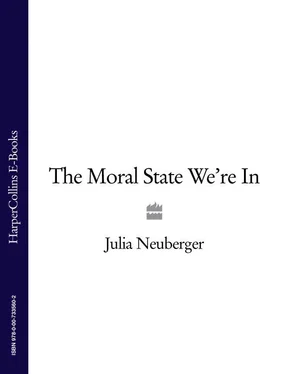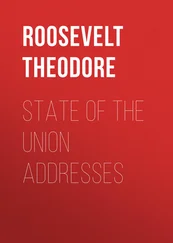THE MORAL STATE WE’RE IN
A MANIFESTO FOR A 21ST CENTURY SOCIETY
Julia Neuberger

Introduction
1 The Elderly
2 The Mentally Ill
3 The Young and Vulnerable
4 The Prison System
5 The Outsider
Bibliography
Index
Acknowledgements
Copyright
About the Publisher
In March 2004, a wonderful story appeared in The Guardian headed: ‘Q. How many care workers does it take to change a light bulb? A. Ask a risk assessor.’ *
The Department of Health had devised an advertising campaign to attract people into becoming care workers that showed a care worker reaching up to put a new bulb in for an old man–without any obvious assistance. The advertisement read: ‘If you could do the small things that make a big difference, you could earn a living in social care.’ But many care workers say they are not allowed to change light bulbs–not on their own, at least. One local authority said it might take four people to do it: one to hold the ladder, one to turn off the electricity at the mains, one to stay with the old person, and one to change the light bulb. This is to comply with both Health and Safety rules and electrical safety legislation, but it obviously leads to some considerable difficulties. It is this kind of risk aversion–extreme though this case is–that this book is about: rules and regulations, well founded, well meant, even theoretically sensible, that yet lead to an extraordinary situation in which a care worker cannot change a light bulb for fear of the consequences, and which makes the lives of vulnerable people more difficult than they need be.
This is an extreme example, but it is not unusual. For six years I was Chief Executive of the King’s Fund, a charity devoted to the health and healthcare of Londoners, with a watching brief for the National Health Service as well. During that time–and indeed before–I have watched bemused as we have apparently become less and less caring for, or even aware of the suffering of, the most vulnerable in our society. This is not to say that there are not hundreds of thousands of people who, every day, carry out acts of kindness for a variety of people in trouble. Nor is it to say that we are bad people, or uncaring–though we may be–or insensitive to the needs of others, or incompetent, or somehow unaware in other ways. Nor is it to argue, as religious leaders have often done, that we have become selfish–though that, too, may be partially true. I believe that something else is going on: a complex pattern of interacting ideas, events, the Zeitgeist, and personal human attitudes that has somehow allowed us to reach this position. In this book I hope to tease out some of the contributing factors by examining what has happened to some of the most vulnerable groups in our society–the elderly, the mentally ill, children in care, offenders, and asylum seekers.
As I began the thinking for this book, I realized that I was not alone in my concerns. I was astounded by the number of people of all political persuasions, all backgrounds, classes, and creeds, who told me I needed to write it, that it was somehow important. They were not necessarily going to agree with me, but they believed we needed to ask ourselves some questions, and that the stories in our daily newspapers, the material with which we argued over politics–insofar as anyone did any more–or social issues or economics suggested some deep-seated problems in thinking about how we might sort our society out.
Concerns varied. There was a passionate concern about how we treat the elderly in our society, about the welfare of people with mental illness, and about what happens to children in care.
There was also a widely expressed view that our penal policy is a mess: we are putting more and more people into prison, but we have less and less idea about whether we are trying to punish, rehabilitate, contain, or simply forget about them.
Then there was a growing body of opinion that felt our policies towards asylum seekers were plain cruel, that if we could not sort out our immigration and appeals system then it was hardly fair to blame those who were trying to come to the UK, even if some were–to use the jargon–economic migrants rather than true refugees.
These are some of the issues that concern many of us–and may also touch us directly. The proper care of our elderly relatives is an issue that we all have to face at some time. Many of us know someone with mental health problems, and we may ourselves have had some period of depression or some other relatively minor mental illness and so will have seen first-hand something of what the system offers (or fails to offer) by way of help and support. Most of us will have read horrendous stories about children in care and what happens to them when they leave–we may even have experienced this ourselves. We may also have read about, or have first-hand experience of, ex-offenders, some of whom will have been in care and many of whom have mental health problems. And whilst most of us will not have direct experience of today’s asylum seekers, many of us may know someone whose family came to this country as refugees.
What kind of society is it that locks up those with mental illness in prisons, rather than placing them where they can get help and care, that fills them up with drugs but shows them little kindness?
What kind of society is it that allows our young care leavers to gain access to the criminal fraternity so easily and denies them the support of mentors and befrienders in their late teenage years and early adulthood?
What kind of society is it that makes so little effort regarding ex-offenders that many of them feel so unsupported that they fall back into offending for want of anything else to do?
What kind of society is it that locks up children from asylum-seeking families, that fails in its duty of kindness towards the stranger, and that fails to recognize the rights of children, who are in no way to blame for their lot?
And what kind of society is it that fails so lamentably to protect older people from abuse whilst also failing to offer proper long-term care for those who need it?
We have made it more difficult to help such people. Part of this book will examine why it is so hard for ordinary people to help those less fortunate than themselves–the kid in care, the old lady next door whose life is getting tough. For, as a result of scandals surrounding some of our institutions–for example in children’s homes, schools, and foster homes–we do not allow ordinary people to help. For instance, an obsession–not wholly misplaced–with sexual predators has made it necessary for anyone who works with children to undergo a police check. Until recently it also meant that a child in the care of foster parents could not spend a night with a friend unless the friend’s parents agreed to undergo police checks too. The need for school teachers and helpers to be checked for their past record also means that those who might be willing to help on an occasional basis must also be checked by police.
Such vigilance in itself may be no bad thing. But the fact that we have become so stringent in our requirements for checks on those who work or have any relationship with children means two things: first, that children themselves are encouraged to be suspicious of adults in a way that may be quite unhealthy, both for themselves and for society as a whole; second, that those who are inclined to look after a child or young person who is distressed–who is, for instance, lost, or is being attacked by older children–will be very nervous of getting involved. Suspicion of motives has forced some people, particularly men, to restrain ordinary common decency and kindness. Yet many of our most troubled young people–though by no means all–have no regular, stable male role model in their households. Add to that an ever-growing worry over paedophilia and you have a picture of a society that wants to protect children from potential attack but which may end up by destroying valuable relationships between young people and their elders, purely because fear of sexual attack takes precedence over a belief in ordinary common humanity. When photographs of children at nursery school cannot be taken without parental consent, for fear of pornographic use, we have a problem. When we are so suspicious of adults’ motives in wanting to help a child that one cannot help in a school–even one’s own children’s school–without a thorough and lengthy police check, we may have a legitimate point of concern, but we will deter all but the most determined helpers.
Читать дальше







![Nicholas Timmins - The Five Giants [New Edition] - A Biography of the Welfare State](/books/701739/nicholas-timmins-the-five-giants-new-edition-a-thumb.webp)





